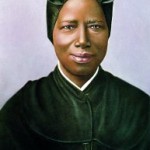Benedict Speaking on Hildegard of Bingen, 09/08/10
English and Welsh bishops are urging Catholic parents to dress their children as saints this Halloween.
At first consideration, that might not seem too remarkable. But when one takes into account how timid Catholics have been in the UK in recent years, perhaps it is remarkable indeed. Perhaps the Halloween suggestion reflects some of the first fruits of Pope Benedict XVI’s recent visit to England and Scotland. British journalist Paul Burnell writes:
Since the pope’s mid-September visit here, there is a definite sense of English Catholics suddenly rediscovering their confidence (the Scots have never lacked this). This emboldened spirit even seems to be emerging from the normally reticent hierarchy. Archbishop Vincent Nichols of Westminster (London) in a pastoral letter following the pope’s visit urged his flock to make their faith more visible in daily life, by offering to pray for people, by openly blessing themselves with the Sign of the Cross, or by making such remarks to people as “God bless you.”
Now to some, especially in a country as in-your-face religious as the USA, this may seem pretty basic. But in one of Europe’s most secular nations, where even an employee of British Airways was disciplined for wearing a cross, this is quite up-front and noteworthy.
Indeed, it is. Burnell’s piece is heartening, and that what Benedict’s visit–whose theme for the visit was John Henry Newman’s motto, Cor Ad Loquitur (heart speaks to heart)–seems to have done; put some heart into UK Catholicism.
This, of course, is quite a different result than one might have expected, had one’s only source for the papal visit been Lisa Miller’s absurd piece in Newsweek, published as the Pope was only just arriving in Scotland.
In a piece dated September 16 and entitled Fiddling While Christianity Burns; Pope Benedict is hitting all the wrong notes in his trip to the United Kingdom, Miller immediately finds fault with the Pope’s visiting the United Kingdom instead of stricken Ireland (he will likely go there in 2012. Ms Miller must know these visits are planned rather far in advance) and then seeks out exclusively negative projections about Benedict’s meeting with the Archbishop of Canterbury, which–of course–could only be disastrous.
In fact, the papal visit to the UK cannot be characterized as anything but an unmitigated success by any measure. The historic joint prayers, worship and meetings between Dr. Rowan Williams and the pope went, well, swimmingly.
A quick search on various engines reveals that Lisa Miller (who, in March, referred to Benedict as The Bad Shepherd) and Newsweek, feeling the need to predict the worst, felt no additional compunction to follow up their negativity with any sort of actual reporting on the papal visit, or on the remarkable crowds that attended the pope as he moved throughout the UK.
In that, Newsweek was not alone. Most Americans, unless they were watching EWTN or checking Catholic websites, were left completely uninformed of the four-day-lovefest that was Benedict’s visit to Scotland and England. The world needs to see positive stories, but this was the wrong sort of positive, I suppose, and so it was completely ignored by the US press.
No one expects the press to cheer for the pope without criticism, or to act as his advance team; the press got away with doing that for Barack Obama, and it did not suit or serve. But is it too much to ask the press to file accurate reports on realities, rather than simply spewing their disdain with creepy, one-sided hisses?
Lisa Miller likes to say that Benedict “strikes all the wrong notes,” but it seems perhaps she has willfully closed her ears (or her heart) to his performance, because she consistently under-estimates him, misinterprets him or gets him completely wrong, as she does regarding Benedict’s recent talks on Hildegard of Bingen. Miller, unable to see anything except through the narrow lenses of her age and ideologies, gripes and mistakes her way through Benedict’s two-part discussion, given over the course of two General Audiences. She writes:
How infuriating, then, that Hildegard has not been formally canonized, though her feast day is celebrated in Benedictine communities and in Germany, the land of her birth. How doubly infuriating that when Pope Benedict XVI mentioned her in a speech last month, he made her an example of Christian submission.
…
Two thousand years after a young Jewish girl named Mary said yes to an angel, according to the Gospels, the institutional Roman Catholic Church still has not learned how to appreciate the human heroines in its midst. This is a shame, for women are the spine of the church.
Well…that’s just crap, but I wouldn’t expect Miller to understand that it is crap or why it is crap, because she is resolutely closed to exploring the possibility that she might be mistaken, or that her perspective could possibly be so narrow as to miss the sort of nuances she is believes herself attuned to.
Benedict, in fact, gave a rip-roaring lesson on Hildegard:
“. . . this great woman, this “prophetess” who also speaks with great timeliness to us today, with her courageous ability to discern the signs of the times, her love for creation, her medicine, her poetry, her music, which today has been reconstructed, her love for Christ and for his Church which was suffering in that period too, wounded also in that time by the sins of both priests and lay people, and far better loved as the Body of Christ. Thus St Hildegard speaks to us; [. . .]”
and…
Many male and female monastic communities turned to her, as well as Bishops and Abbots. And many of her answers still apply for us. For instance, Hildegard wrote these words to a community of women religious: “The spiritual life must be tended with great dedication. At first the effort is burdensome because it demands the renunciation of caprices of the pleasures of the flesh and of other such things. But if she lets herself be enthralled by holiness a holy soul will find even contempt for the world sweet and lovable. All that is needed is to take care that the soul does not shrivel” (E. Gronau, Hildegard. Vita di una donna profetica alle origini dell’età moderna, Milan 1996, p. 402). And when the Emperor Frederic Barbarossa caused a schism in the Church by supporting at least three anti-popes against Alexander iii, the legitimate Pope, Hildegard did not hesitate, inspired by her visions, to remind him that even he, the Emperor, was subject to God’s judgement. With fearlessness, a feature of every prophet, she wrote to the Emperor these words as spoken by God: “You will be sorry for this wicked conduct of the godless who despise me! Listen, O King, if you wish to live! Otherwise my sword will pierce you!” (ibid., p. 412).
. . .With the spiritual authority with which she was endowed, in the last years of her life Hildegard set out on journeys, despite her advanced age and the uncomfortable conditions of travel, in order to speak to the people of God. They all listened willingly, even when she spoke severely: they considered her a messenger sent by God.
Yeah, that prig Benedict certainly tried to redefine Hildegard as a simpering milquetoast, didn’t he? Lisa Miller wants you to think so, because it goes with the “Catholics-Keep-Women-Down” narrative, and the narrative must be preserved above all, even above the truth.
Hildegard, and Theresa of Avila (the great Carmelite Saint, Reformer and Doctor of the Church whose feast we celebrate on Friday), the immensely influential Catherine of Siena, our newest beata, 18 year-old Chiara Luce Badano –and Dorothy Day, and Elizabeth Ann Seton, Katharine Drexel, and thousands of other strong Catholic women who were encouraged in their self-actualization by the Catholic church when larger societies thought of women as mere chattel–might beg to disagree with Miller.
They understood, as the modern world cannot, that “obedience,”–as understood by the Christian–has nothing to do with oppression. It is, in fact, the powerful and perfect prayer that brings true freedom.
Hopefully, that understanding will arise with the deep-seeded fruits recently planted in the United Kingdom, and elsewhere. And it will be a good, not an evil, thing.
Get Religion looks at the acceptable prejudice against the church in the press.












